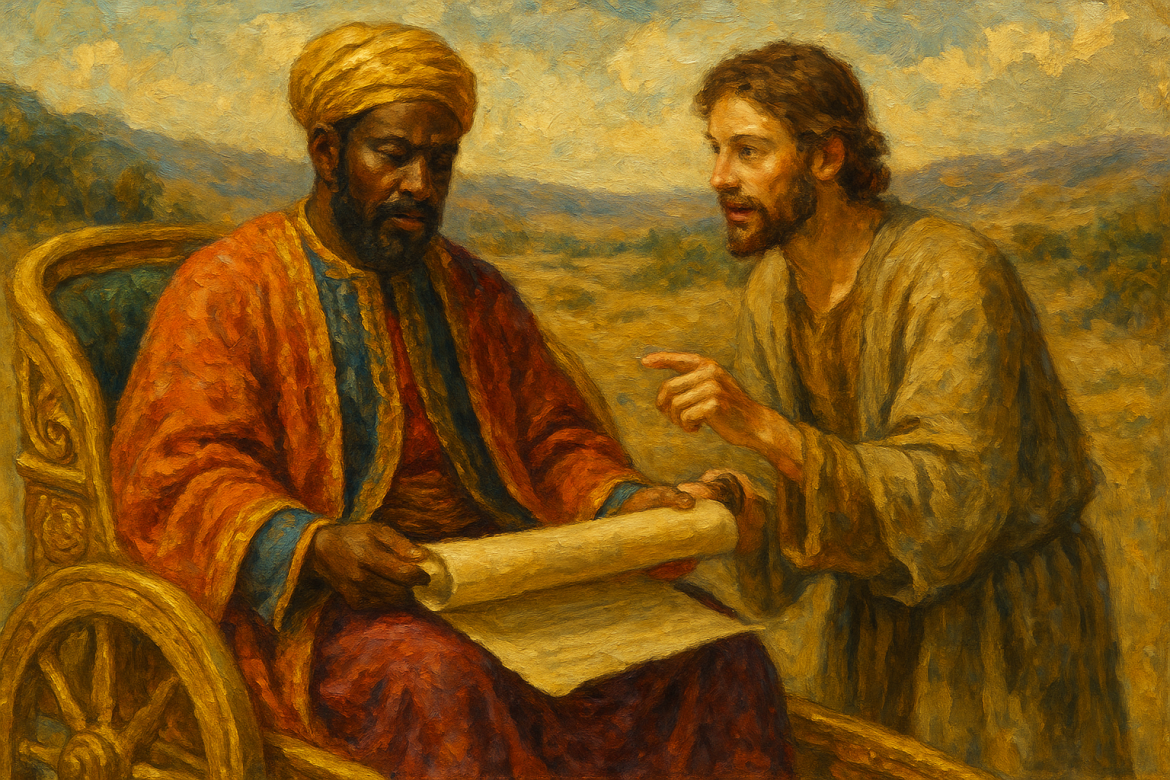Introduction: When Disruption Leads to Divine Purpose
The early church faced intense persecution after the death of Stephen, and Acts 8 marks a pivotal chapter in the growth of Christianity. Rather than stifling the message, persecution acted as a catalyst for the spread of the gospel. This chapter challenges our ideas of comfort, obedience, and how God uses unexpected events—and even broken people—for holy purposes. Through characters like Saul, Philip, Simon the sorcerer, and the Ethiopian eunuch, Acts 8 shows us that the gospel is not only unstoppable, it’s deeply personal.
Scattering with a Purpose
Acts 8 opens with Saul (later Paul) approving the execution of Stephen. His violent persecution of the church forces believers out of Jerusalem into surrounding regions like Judea and Samaria. What appears as a loss is actually the fulfillment of Jesus’ command in Acts 1:8—to take the gospel beyond Jerusalem.
A vivid analogy compares this dispersion to hitting a dandelion with a weed whacker: intended to destroy, it actually spreads seeds even farther. Likewise, the attempt to destroy the early church only planted the gospel in more places. This part of the story reminds us that God’s purposes can be advanced in seasons of hardship, and what feels like being pushed out might actually be being sent on mission.
Philip: The Unlikely Evangelist
Philip isn’t one of the apostles or even a well-known disciple. He’s a man who rose from the community of believers to serve the church, originally tasked with helping Hellenistic widows. Yet he becomes a key player in spreading the gospel to Samaria—a region long estranged from Jewish religious life.
Despite the tension between Jews and Samaritans, Philip brings the message of Christ and performs miraculous signs. People believe. Even Simon, a local magician who previously amazed the crowds with sorcery, becomes a believer and is baptized. This demonstrates that the power of God is greater than anything else we revere, and that transformation can happen in the unlikeliest hearts.
The Cautionary Tale of Simon the Sorcerer
Simon’s story is both inspiring and cautionary. Though he believes and is baptized, his old mindset lingers. He tries to buy the power of the Holy Spirit, exposing his heart’s misunderstanding. Peter’s sharp rebuke makes it clear: God’s gifts are not for sale.
This scene teaches us that spiritual transformation is not transactional. The gifts of the Holy Spirit come through relationship, not manipulation. It’s also a reminder that even sincere-seeming believers can still struggle with old patterns of thought. The church must disciple new believers with both patience and truth.
The Ethiopian Eunuch: Hunger for Truth
Perhaps the most moving moment in Acts 8 is Philip’s divine encounter with an Ethiopian eunuch—a court official under Queen Candace. This man is reading from Isaiah and admits he doesn’t understand it. Philip explains that the passage speaks of Jesus. The eunuch is so moved that he asks to be baptized on the spot.
There are no prerequisites, no theological tests, no waiting period. Just water, willingness, and faith. This beautiful moment emphasizes that the message of Jesus transcends nationality, status, and social boundaries. It’s for everyone—and it’s meant to be shared now, not after a six-week course.
Breaking the Barriers to Baptism
One powerful reflection from this chapter is how we sometimes overcomplicate access to baptism and the Holy Spirit. Acts 8 suggests that when someone expresses faith and asks to be baptized, that desire itself is evidence of the Spirit’s work.
Yes, discipleship is important, and the community should support new believers. But the moment of belief is sacred. We should not delay what God is ready to do in someone’s life. Instead, we should celebrate it—and walk alongside them in the learning that follows.
Applying Acts 8 to Today
So how do we live out Acts 8 in our world?
- Embrace hardship as opportunity. When comfort is shaken, ask where God might be sending you.
- Welcome unlikely leaders. Philip wasn’t famous, but he was faithful. Many modern “leaders” in faith start from humble acts of service.
- Disciple new believers gently. Like Simon, people come with baggage. Growth takes time.
- Don’t gatekeep baptism. If someone is ready and willing, don’t put unnecessary obstacles in the way.
- Share the gospel personally. Like Philip with the eunuch, look for individual moments of spiritual hunger and meet people where they are.
Conclusion: The Gospel Moves Through Us
Acts 8 reminds us that the movement of God doesn’t depend on buildings, titles, or smooth circumstances. It flows through obedience, through scattering, through those who dare to speak when the moment arises. Whether it’s a persecuted church or a curious seeker in a chariot, God is always orchestrating encounters that lead people to Jesus.
This chapter invites us to stay ready—not just to go, but to go without hesitation. And when someone says, “What keeps me from being baptized?”—our answer should be, “Nothing.”
✅ Next Steps:
- Look for small acts of obedience that could lead to big spiritual impact.
- Don’t underestimate your story—God uses all kinds of people for His purposes.
- If you’ve been hesitant to act on your faith, let Acts 8 be your permission to move.
Stay bold. Stay obedient. The seeds you scatter may just change someone’s world.

